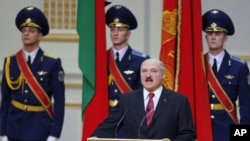Belarus President Alexander Lukashenko was inaugurated Friday for a fourth term. Sometimes called "the last dictator in Europe," Lukashenko now may see his rule stretch for 21 years.
Speaking in Belarussian, Alexander Lukashenko was inaugurated as president of Belarus in a ceremony marked by isolation.
The streets of Minsk were eerily empty when the president and his nine motorcycle convoy swept down Independence Avenue. One month earlier, 40,000 people filled that same avenue, protesting an election they said was rigged.
For the inauguration, the ornate Palace of the Republic filled Friday with rows upon rows of hand-picked government officials. But envoys of the United States and the European Union boycotted the event, staying as far away as possible.
The American Charge d'Affaires, Michael Scanlan, visited Grodno, a city on the Polish border, a five-and-a-half-hour-drive west.
The European ambassadors drove three-and-a-half hours north to Vilnius, Lithuania. There, they met with students at European Humanities University, a university that calls itself a Belorussian university in exile.
For Belarussians watching the inauguration on TV, their president started his new term with a tough speech, warning that "The limit of revolutions and upheavals in Belarus has been exhausted."
Referring to democratic street revolutions that toppled authoritarian leaders in Ukraine and Georgia, he warned: "The virus of 'color' revolutions hits only weak countries."
Turning to his neighbors to the west, he threatened: "To the ill-wishers of Belarus, I want to recall one popular adage: "Do not blow your neighbor's fire - it could accidentally spread onto your house as well"
On Friday, Sovyetskaya Belorussia, the leading official newspaper, charged that foreign donors funneled $20 million to Andrei Sannikov, the presidential candidate who came in second in the Dec. 19 vote. On Thursday, President Lukashenko charged that the intelligence services of Germany and Poland plotted to overthrow him through election campaigning and street protests.
In response, German Foreign Minister Guido Westerwelle said: "These baseless charges are intended to detract attention from the real injustice."
Westerwelle says a wave of post-election arrests is prompting the U.S. and the EU to move toward sanctions.
Dick Durbin is one of several American members of Congress who is criticizing the Lukashenko crackdown. Last week, Durbin, who is assistant Senate Majority leader, visited Minsk and met with families of jailed activists and candidates.
Referring to the seven presidential candidates who were jailed, he said, "The fact that four of them still languish in prison today is an indication to me that Lukashenko just does not understand that sort of conduct is totally inconsistent with human rights and democratic values. I know that European Union is about to take action. I hope the U.S. will join in that action so the people of Belarus will understand that this action by their leader is unacceptable."
The Obama administration is studying ways to tighten sanctions against the Belarus leadership. On Saturday, U.S. Deputy Assistant Secretary of State Thomas Melia, the State Department’s lead official for Human Rights policy, is to visit Belarus for a four-day visit.
Senator Durbin said that the Belarus president knows a solution to the sanctions threat.
"Lukashenko can resolve this himself, immediately, by releasing these people from prison and dropping the charges," he said. "And I hope we don’t have to consider any further sanctions that would have an impact on the nation of Belarus."
But President Lukashenko shows no sign of relenting. On Thursday he said on national television of his political rivals: "They should not be sitting in their isolation cells like blind mice, hoping that the Americans and the Europeans will soon come to their rescue."
On Thursday, the European Parliament voted in favor of a wide range of sanctions, ranging from visa bans for the Belarus president and his top aides to denying Belarus funding through the International Monetary Fund.
President Lukashenko, a man with big fists and a short temper, often compares politics to his favorite contact sport - ice hockey.
In response, the European Parliament is threatening to hit him where it hurts. If Belarus does not release its political prisoners, the European Parliament says, the World Hockey Championships should not be held as planned in Belarus in 2014.
In Moscow, foreign affairs analyst Fyodor Lukyanov said such moves are symbolic.
"I don’t believe the Europeans will be ready to impose real economic sanctions on Belarus," Lukyanov said. "For example, to stop trading, to stop buying Belorussian oil product - because that will be bad for European economy, so they will not do it. And the rest is just about symbols."
Lukyanov predicted that Moscow would take advantage of Belarus’ estrangement from the west to weave closer ties.
Indeed, on Thursday, Russian Prime Minister Vladimir Putin received his Belarussian counterpart and promised $4 billion in annual energy subsidies and the construction of a $6 billion nuclear power plant.
First planned in the early 1980s, the nuclear project was dropped after the Soviet-made nuclear plant in Chernobyl, Ukraine caught fire in April 1986.
Belarussians say their nation received 70 percent of the nuclear fallout from Chernobyl. As a result, nuclear power has long been a taboo topic in Belarus. But, now, with President Lukashenko embarking on a new five year term, it looks like Belarus will finally get its own Russian-designed nuclear power plant.
Belarus President Inaugurated in Isolation
- By James Brooke






